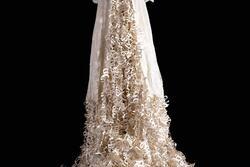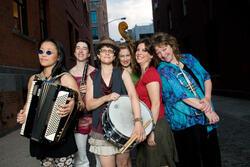Queer Identity: More Questions than Answers
Originally published on June 18th, 2012 at Sex Ed Transforms.
I didn’t realize it would be so hard to be queer after I got married. Seems like it should have been obvious to me, right? Marry a heterosexual cis-man, turn in queer club card, do not pass go, still collect hundreds of dollars of apparently-straight privilege. Is that how it has to be?
I had a boyfriend in college who once told a friend I was bisexual. His friend asked, “Is she actively bisexual?” Actively? What does that mean? At this very moment? My boyfriend told me this story in order to laugh at that friend’s ignorance. Silly friend, he must think that being bisexual requires actively pursuing multiple partners at the same time. Clearly, us enlightened folks knew I could be bisexual and just have a boyfriend and no other partners. No problem with that, right?
At the time, I felt no a problem with that at all. My sexual orientation was about my identity, and it was about my past and my future as much as my present. I never even really identified as bisexual. Mostly, I identified as queer, which allowed me to position myself as “not heterosexual” while not succumbing to a word with the prefix “bi,” referring to a binary conception of gender in which I do not believe.
Actually, it wasn’t until deep into my current relationship that I started identifying as bisexual sometimes. “Bisexual” seems like a more specific identity than “queer,” staking a claim in the queer community that can more easily be reconciled with my current relationship status. But the truth is, it’s not like I walk around with a “bisexual” sticker on my forehead, and not a lot of people ask me how I identify. So it only seems to come up when I bring it up.
I’ve been partnered with a cismale for four years, and last year we publicly committed to each other through that complicated ritual commonly known as a wedding. Our relationship is monogamous, so I am not “actively” bisexual, since I am not pursuing sexual liaisons with anyone besides my partner. Given my current situation, what would it mean for me to be somehow “meaningfully” queer/bisexual? In my last relationship, my sexual orientation signified the diversity of my past and my future liasons. But I have no plans to pursue other relationships now or in the future. Without opening up our relationship or engaging in some form of non-monogamy, what would it mean for me to have a meaningful queer identity in the present?
The Klein scale has seven categories for assessing sexual orientation: attraction, sexual behavior, sexual fantasies, emotional preference, social preference, lifestyle preference, and self-identification. It is only in the “sexual behavior” category that change has occurred for me. So my identity inside really hasn’t change much, but the most visible marker that communicates my identity to other people has certainly changed. What I’m trying to figure out is, what effect does this have on my life, and on my membership in queer community?
I want to take a minute to discuss privilege, which, not so coincidentally, I also wrote about privilege last year on pride weekend. As David Levy wrote recently, the Pride Parade is a celebration as well as a political action. Since I benefit from all kinds of heterosexual privilege in my life, in what ways is this protest/celebration my parade, and in what ways is it not? I try to keep myself from taking up too much space, and I try to stay sensitive to the times when I should step back and take a position as an ally rather than claiming queer celebration as my own. But maybe I’m wrong, because it feels wrong when I do that, because queer is my own.
I’ve met a few people recently at queer events whom I really liked, and I might have vaguely led them to believe I’m queer, simply through context and association, and maybe also discussion of our life histories. It isn’t actually leading them on, since I am queer. But then later, they find out about my current situation. Do they still believe me that I’m queer? Do they feel I lied to them or led them on? Did I somehow owe it to them to be super-clear and upfront about my orientation and relationship status, even though they didn’t ask? Am I doing something wrong? Or not? Or should I just drop all this self-doubt and get over it?
Bisexual invisibility is a very tricky issue, because it is a privilege and a pain at the same time. I benefit from an extraordinary amount of material and cultural hetero-privilege. At the same time, I feel invisible within my queer community because I don’t know if people think I’m legit, or if I can ever be legit, or if I am taking up too much space, or if I’m needlessly shooting myself down with internalized biphobia or some other crap. It’s all very confusing and complicated. I have a feeling that there really aren’t clear answers, but I have a bunch of questions, and I would love to know what you think.
Sex Ed Transforms is a blog about sex education and communication that addresses how we influence ourselves, each other, and the young people in our lives with regards to sex, sexuality, and relationships. To learn more, follow Mimi on Twitter.







Excellent article. Really eye-opening for straight allies. Thank you for sharing your thoughts.
I do disagree with you about one thing. When you say, "Bisexual invisibility is a very tricky issue, because it is a privilege and a pain at the same time," it is VASTLY more a privilege than a pain. People in the queer community need to advocate for their very right to marry who they want in most states. This isn't a problem that bi-sexuals partnered with cis partners in monogamous relationships face. I understand your concern with not feeling like the queer community is terribly interested in your perspective and I have to say it is probably most analogous to the awkwardness male feminists face (after all, there are some extreme feminists who argue that men cannot by definition be feminists).